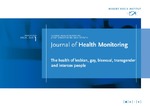The health of lesbian, gay, bisexual, transgender and intersex people
Pöge, Kathleen
Dennert, Gabriele
Koppe, Uwe
Güldenring, Annette
Matthigack, Ev B.
Rommel, Alexander
Sex, gender and sexual orientation are diverse, as are the ways of living associated with them. The extent to which people
can live a free and self-determined life according to their own body, gender, sexuality and way of life influences their social
resources, opportunities for participation and discrimination and has an influence on their life situation and health.
A narrative review of lesbian, gay, bisexual, transgender and intersex (LGBTI) health was conducted including international
and German reviews, meta-analyses and population-based studies. The focus of this article is the legal, social and medical
recognition as well as health status of LGBTI people in Germany. While the legal framework in Germany for homosexual
and bisexual people has gradually improved, many civil society stakeholders have pointed to major deficits in the medical
and legal recognition of transgender and intersex people. In addition, scientific findings frequently have not yet found
its way into medical practice to an adequate extent. Available data on LGBTI health indicate a need for action in the areas
of mental health and health care provision. However, due to a lack of comprehensive data, conclusions cannot be drawn
on the general health situation and health resources of LGBTI people. For the concrete planning and implementation of
measures as well as the differentiated portrayal of the situation in Germany, the databases must be expanded, not least
via population-representative surveys.
Files in this item

